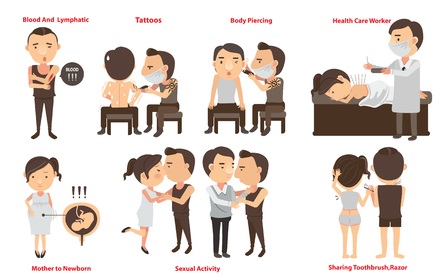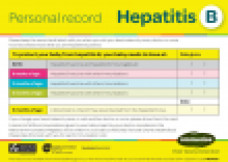Hepatitis B (pokenga ate) is a virus that causes inflammation of your liver.
On this page, you can find the following information:
- How is hepatitis B spread?
- What are the symptoms of hepatitis B?
- Who is at risk of hepatitis B?
- How is hepatitis B diagnosed?
- How is hepatitis B treated?
- How can hepatitis B be prevented?
- Support for people with hepatitis B
Key points
- Hepatitis B virus is spread through contact with the blood or other body fluids of an infected person. The virus attacks your liver cells causing either short-term (acute) or long-term (chronic) hepatitis.
- Acute hepatitis infection can make you feel unwell, but most people recover fully. It is important that you protect others from becoming infected.
- A simple blood test can establish whether you still have the hepatitis B virus in your blood or whether you have been able to successfully get rid of the virus.
- Chronic hepatitis B is when you test positive for the hepatitis B virus for more than 6 months after your first blood test result. This means that your immune system was not able to get rid of the hepatitis B virus and it still remains in your blood and liver. The symptoms of chronic hepatitis B are less noticeable. Treatment is focused on preventing long-term liver damage. Read more about chronic hepatitis B.
- One of the most effective ways to avoid getting hepatitis B is to get the hepatitis B vaccine. This is part of the childhood immunisation schedule. Older children and adults can also be vaccinated.
How is hepatitis B spread?
Hepatitis B is spread through contact with the blood or bodily fluids (such as saliva and semen) of an infected person.
| Ways in which hepatitis B is spread |
|---|
Through unprotected sex including anal or oral sex.Through tattooing or body piercing with unsterile equipment.By sharing injection equipment, toothbrushes or razors.Through a needle stick injury.From mother to child during childbirth. |
Hepatitis B is not usually spread through:
- sharing food and utensils
- kissing on the mouth
- coughing or sneezing everyday contact, such as in a school or workplace
- playing contact sports, as long as wounds are covered and you remove yourself from play to attend to any injuries involving blood
- breast milk
- urine, poos or vomit, unless these contain blood.
What are the symptoms of hepatitis B?
Symptoms can appear anywhere from 6 weeks to 6 months after becoming infected, often after 2–3 months. Some people do not have any symptoms, but others can have symptoms such as:
- feeling sick or vomiting
- lack of appetite
- flu-like symptoms, such as tiredness, general aches and pains, fever or muscle aches
- stomach pain
- pale, clay-coloured poos and or dark coloured urine
- yellowing of your skin and eyes (known as jaundice).
Who is at risk of hepatitis B?
Anyone can get hepatitis B, but those most at risk are:
- babies born to mothers who have hepatitis B
- people with multiple sex partners
- men who have sex with men
- people with a sexually transmitted infection (STI)
- people who inject illegal drugs
- people who use unsterile equipment for tattooing
- people who live with someone who has hepatitis B
- healthcare and public safety workers exposed to blood at work
- people having kidney dialysis
- travelers to regions with intermediate or high rates of hepatitis B
- people who participate in contact sports where there is high risk of bleeding injury
- people aged 25 years or over who are of Māori, Pasifika or Asian ethnicity
- people born in Asia or the Pacific Islands.
Children are at greater risk of chronic hepatitis.
Most people with chronic hepatitis B infection were infected as babies (from their mother at delivery) or as young children (from playing with infected children or close contact with an infected family member).
Children who have the disease usually develop a mild illness, but sometimes they’ll have no symptoms. They are more likely to continue to carry the virus (called hepatitis B positive). Many years later, they may develop liver damage and cancer. For this reason, all infected children require long-term follow-up.
When adults are infected, they usually become sick with acute hepatitis (jaundice, abdominal pain and vomiting), but are at much less risk of developing chronic hepatitis.
How is hepatitis B diagnosed?
Hepatitis B can be diagnosed with blood tests to detect the presence of the hepatitis B virus or antibodies to the virus. During the early stages of acute hepatitis B blood tests may show changes in your liver function.
If you are at higher risk of getting hepatitis B, get tested. If you are pregnant, you should also get tested as part of antenatal blood testing. Read more about hepatitis B and pregnancy.
| If you are in one of these high risk groups, get tested for hepatitis B: |
| Māori, Pasifika, South East Asian or Chinese ethnicityaged over 30 yearsunsure if were vaccinated against hepatitis B as a childborn in a country with high rates of hepatitis B or travelling to these countries, such as the Pacific Islands, China, South East Asia, Middle East and Africayour mother or close family or household member has hepatitis Byou’ve had unprotected sex with an HBV-infected personyou are a current injecting drug user or injected drugs in the pastyou’ve had tattoo, piercing or other cosmetic procedures using unsterile equipment in locations with few safety standards, such as in prisonyou engage in higher risk sexual activity, such as sex work, men who have sex with men, unprotected sex while travelling in a country with high Hepatitis B prevalenceyou’ve come into contact with blood, through sports, assault, needle stick injury, etc. |
If you test positive for hepatitis B infection, you must take steps to reduce the risk to your sexual partners and others in your household. It’s a good idea for sexual partners and people living in your household to also be tested.
How is hepatitis B treated?
For acute hepatitis B infection, most people manage with support from their family doctor.
For chronic hepatitis B infection, some people may need treatment with antiviral medication. These medicines do not get rid of the virus but they reduce how much the virus multiplies. They help prevent complications such as cirrhosis, liver failure and liver cancer, and also help prevent you passing on the infection to others. Read more about chronic hepatitis B infection
How can hepatitis B be prevented?
Vaccination
One of the most effective ways to avoid getting hepatitis B is to get vaccinated.
- The hepatitis B vaccine is part of the childhood immunisation schedule in New Zealand and consists of 3 injections over 3–6 months.
- All babies should be vaccinated.
- Older children, adults and travelers can also be vaccinated. Ask your doctor or nurse what is right for you.
Read more about the hepatitis B vaccine.
Other ways to reduce your risk of getting hepatitis B
- Never share drug equipment with other drug users. This includes needles, syringes, spoons and filters as well as bank notes or straws to snort cocaine.
- Do not share personal items such as toothbrushes and razors.
- Use a condom during sex, including anal and oral sex.
- Have an STI check before you have unprotected sex with a new partner
- Limit how much alcohol you drink. Read more about safer alcohol limits.
- Make sure any blood spills are cleaned up properly – the virus can live on objects for 7 days or more. Even if you don’t see any blood, the virus could still be there.
Protect new sexual partners
If you are a carrier for hepatitis B and have a new sexual partner then they will be at risk of catching it from you. They should be checked for immunity against hepatitis B (likely if under 25 years as they should be protected by vaccination at birth).
If your partner is not immune, then they can receive a free hepatitis B vaccination which will protect them from getting acute hepatitis B. After they have finished the course of vaccines (3 over 3–6 months), they should be tested for protective immunity against hepatitis B. Until then, you and your partner should use condoms to prevent hepatitis B infection.
Where do I go for a sexual health check-up?
- Your GP.
- Family planning clinics (find a family planning clinic).
- Sexual health clinics have specialists who are experienced in the management and diagnosis of sexually transmitted infections. Each visit is confidential and the people there can help with testing your sexual partners or family members. For some people, the consultation may be free. Find a sexual health clinic
Support for people with hepatitis B
The Hepatitis Foundation of NZ provides a follow-up programme for people with hepatitis B. This is free and their community nurses help follow-up people in the community, through home visits, to provide education and support to individuals and families.
Learn more
Hepatitis B The Hepatitis Foundation NZ
Hepatitis B The Immunisation Advisory Centre, NZ
Hepatitis B Ministry of Health, NZ
Hepatitis B Healthy Sex, NZ
References
- Hepatitis B – treatments now available for primary care BPAC, NZ, 2018
- Hepatitis B Ministry of Health, NZ
Resources
Support
 Phone Healthline for free on 0800 611 116 any time of the day or night for advice on any health issue, no matter how small. In an emergency, phone 111 for an ambulance.
Phone Healthline for free on 0800 611 116 any time of the day or night for advice on any health issue, no matter how small. In an emergency, phone 111 for an ambulance.- Hepatitis B vaccination Immunisation Advisory Centre
- Hepatitis Foundation of NZ 0800 33 20 10
Brochures
Hepatitis B – information guide
Ministry of Health, NZ, 2012
Hepatitis B & the vaccine
Hepatitis Foundation, NZ, 2018
Childhood immunisation booklet
Ministry of Health, NZ, 2019
Hepatitis B and C
Department of Corrections and Ministry of Health, NZ, 2013
Hepatitis B – personal record
Ministry of Health and Health Promotion Agency, NZ, 2014
Videos
Related topics
HepatitisHepatitis AChronic hepatitis BHepatitis C | Pokenga huaketoOverview of contraception methods | Rongoā ārai hapūtangaVaccinesTravel health tipsPeginterferon alfaBACK TO TOPCredits: Health Navigator Editorial Team . Reviewed By: Jacqui Stone, Nurse Practitioner, Middlemore Hospital and Lucy Mills, Clinical Nurse Specialist, Middlemore HospitalLAST REVIEWED: 23 AUG 2019PAGE LAST UPDATED: 10 JUN 2022





